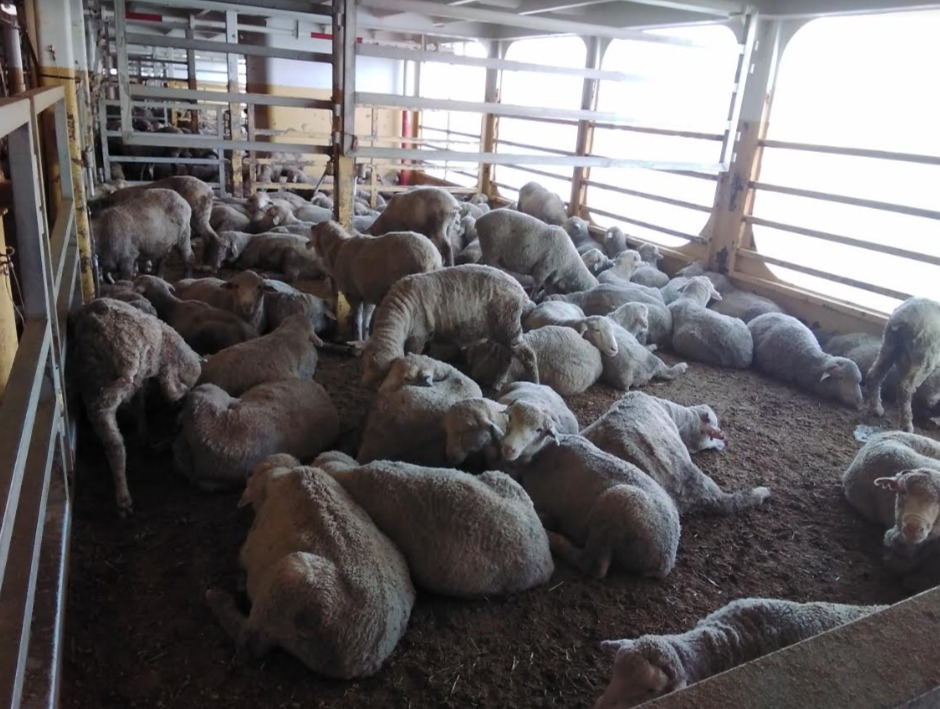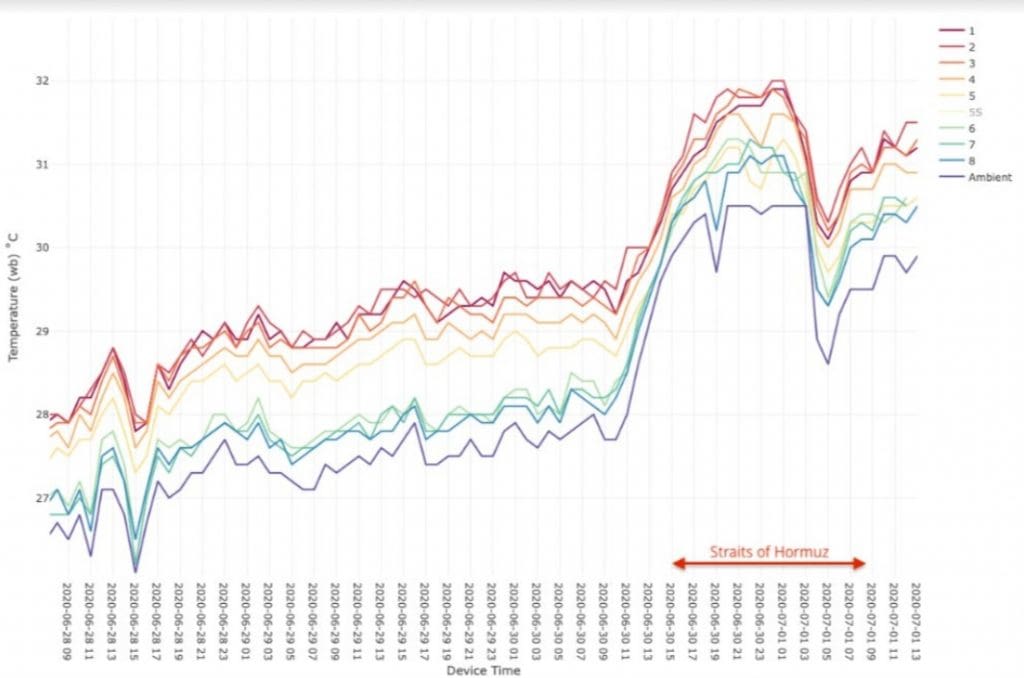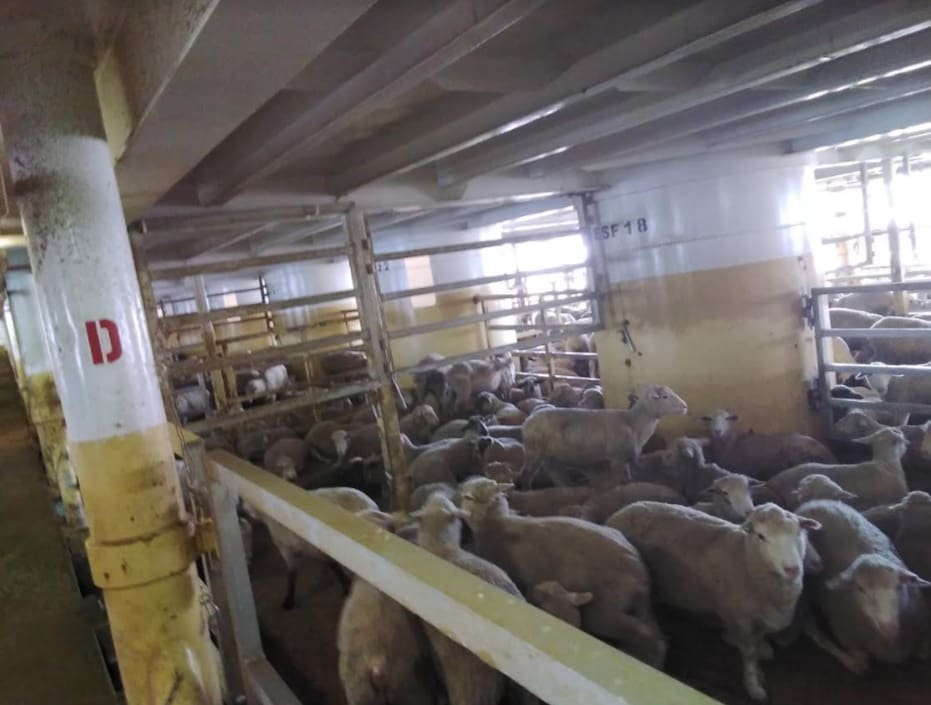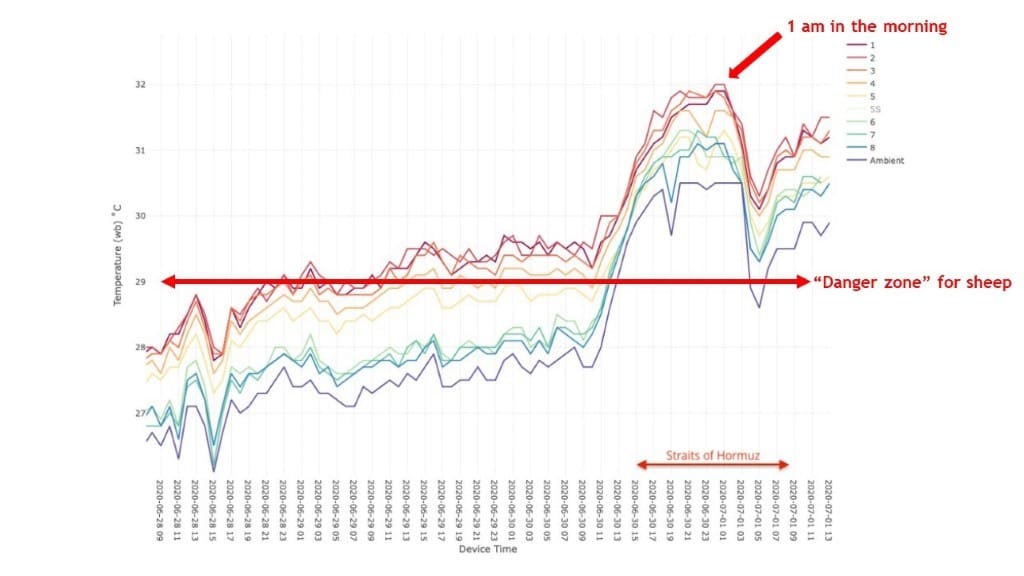
Sheep on board the Al Kuwait during the recent Middle East voyage.
A RECENT Middle East live sheep shipment indicated there was a case for shortening the current Northern Summer moratorium, according to the exporter Rural Export and Trading WA.
The exporter has highlighted sheep behaviour and survival data collected during the voyage as indicating it was “highly successful”, while the RSPCA has claimed on-board wet bulb temperature recordings showed why the Northern Summer ban was introduced and why similar exemptions should never be granted again.
The state-of-the-art livestock export vessel MV Al Kuwait late last week completed discharging about 35,000 sheep in Kuwait after gaining an exemption to the Federal Government’s moratorium that currently runs from June to September 22.
The exporter has reported that 28 sheep (0.08 percent) died on the voyage, with no mortalities attributed to heat stress, despite vessel experiencing wet bulb temperatures of up to 32 degrees Celsius in a 24-hour period, when it travelled through the Straits of Hormuz when 190 sheep were observed with open mouth panting (0.57pc).

The exporter said the on-board veterinarian’s daily records indicated the deaths were due to various causes including pneumonia, infection and injuries.
RETWA said the purpose-built vessel delivered excellent results as part of a well-planned consignment and company managing director Mike Gordon said although he didn’t think there was a case for ending the moratorium, “I think there is a case for shortening it under certain conditions.”
Mr Gordon said RETWA and parent company Kuwait Livestock Transport & Trading would like to see the moratorium shortened.
“What is the point in making improvements if it is a fixed moratorium for ever, regardless?”
Mr Gordon said the shipment represented a large financial loss to KLTT, but it was primarily a food security issue for Kuwait.

Sheep on board the Al Kuwait during its recent voyage.
Data details heat stress – RSPCA

The RSPCA said the granting of an exemption has exposed the animals to excessive heat and humidity, according to data from the vessel’s temperature loggers.
It said Al Kuwait’s on-board data loggers confirmed the Australian sheep suffered multiple days of heat stress with temperatures and humidity far exceeding their heat stress thresholds.
The data also showed there was no respite for the animals overnight, with the hottest temperatures being recorded during the night of 30 June to the early hours of 1 July. The LiveCorp/MLA Veterinary Handbook for Cattle & Sheep defines 29°C+ WBTs as the “danger zone” for sheep.
The RSPCA said the exporter’s observations of open-mouth panting in the sheep were a sign of moderate to severe heat stress.
The temperatures recorded on this voyage are an indictment of the Department of Agriculture’s failure to uphold its own regulations, the animal welfare body said.
“Every one of the 35,000 sheep on board the Al Kuwait have suffered unnecessarily because the department caved into pressure and backflipped on its initial evidence-based decision.
“Describing this voyage as a “success” because of reported low mortality rates shows the industry is still clinging to outdated and inaccurate measures of animal welfare, something the 2018 McCarthy Review strongly warned against.”
The RSPCA said the voyage data confirms that even under significantly reduced stocking densities, reduced wool length, and additional selection criteria, sheep will still experience prolonged heat stress when sent into climatic conditions that exceeded their ability to thermoregulate and shed heat.
Al Kuwait shipment essential for food security KLTT
KLTT chief executive Osama Boodai said the recent Al Kuwait voyage has been essential for Kuwait’s food security.
“We accepted this consignment would incur significant financial losses due to an additional US$90/head costs.
“Kuwait’s people, like Australians, are not travelling as they normally would during this time of year, which has led to increased domestic demand for fresh food. Air freight carcasses have been significantly reduced during COVID, further increasing the importance of this voyage,” he said.
Mr Gordon said the exemption would not have been pursued if the science was not available to also support good animal welfare outcomes.
“The comprehensive exemption process was drawn out.
“The additional conditions added by the regulator created significant challenges to ensure confidence in the welfare of the livestock, which RETWA was able to fully comply with,” he said.
“We were disappointed with the last-minute and unsuccessful appeal by activists against the exemption.
“This is another unfortunate example of attempts to disrupt the industry, paradoxically putting animal welfare at risk.”
RETWA said Al Kuwait departed Fremantle in cool conditions and during its transit of the equator, predicted monsoonal activity and winds kept wet bulb temperatures (WBTs) low. RETWA said as anticipated, WBTs were elevated during the transit of the Straits of Hormuz and entry to the Persian Gulf. The majority of sheep had increased respiratory rates to regulate their body temperatures.
“These respiratory rates rapidly decreased as the vessel entered cooler waters typical of the northern parts of the Persian Gulf with a dry heat and lower WBTs,” Mr Gordon said.
Click here to read the RETWA Al Kuwait voyage updates one, two and three.

No animal should have died at all from infection, pneumonia and injury if the vet was doing his/her job. Possibly they are not permitted to administer treatment. Seeing the sheep panting should have alerted the vet that they were in distress. Being employed by the export company the vet’s reporting would be of a biased nature. Can’t believe a vet would do this job, must be paid well to ignore the suffering of the animals.